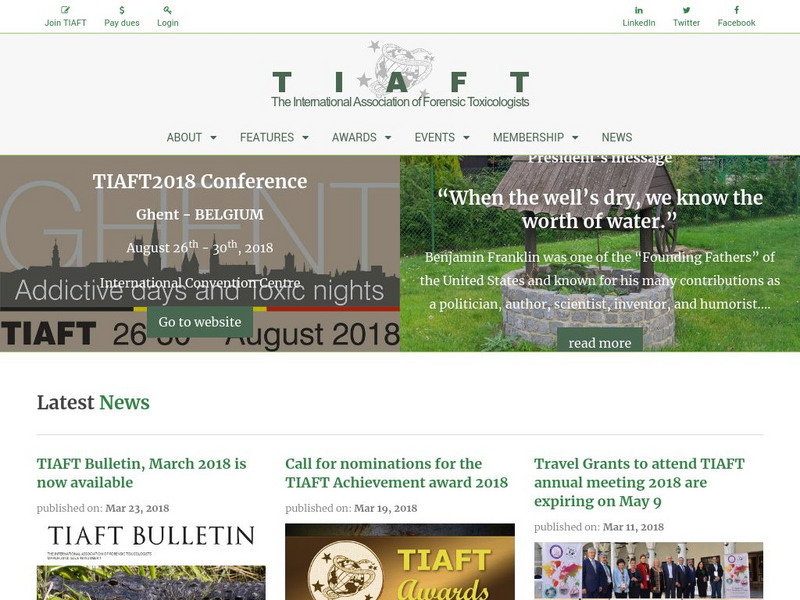Hi, what do you want to do?
Cold Spring Harbor Laboratory
Dna Interactive: Applications
Examples of using DNA for forensic purposes is discussed here, as well as uses to unravel historical puzzles, trace the history of a species and answer health problems.
PBS
Pbs Learning Media: Dna on the Witness Stand
Dr. Eric Lander of the Human Genome Project explains the use of DNA as forensic evidence. He describes the process and need for standards in testing laboratories and discusses the use of DNA evidence as a human rights tool.
Other
Streetlaw: Careers in the Law
If you are interested in being an attorney, corrections officer, court reporter, forensic scientist, police officer, judge or government agent, check out this description of several legal careers. Learn about salary, required education,...
Read Works
Read Works: Focus on Scientists
[Free Registration/Login Required] An informational text about different types of scientists including: an inventor, a forensic scientist, an astronomer, a primatologist, and more. A question sheet is available to help students build...
Other
Debate Central
This is a good starting point for debaters focusing on the National Forensic League's annual topic. Includes a wealth of links to resources, a student message center for debaters, and an Ask an Expert feature.
Georgia Department of Education
Ga Virtual Learning: Forensic Science: Fingerprint Analysis
Why are fingerprints unique to each individual? This comprehensive interactive tutorial explains how fingerprints are classified and stored in AFIS (Automated Fingerprint Identification System). Also explore how fingerprints are...
Science Buddies
Science Buddies: Who Done It? Dna Fingerprinting and Forensics
DNA fingerprinting (also known as DNA profile analysis and DNA typing), is a method of distinguishing between individuals by analyzing patterns in their DNA. This project focuses on the first method of DNA fingerprinting to be developed,...
Columbia University
Columbia University: Dna as a Forensic University
Good article on the power and use of DNA evidence in court cases.
Texas Instruments
Texas Instruments: Cells Never Lie
A forensics activity which deals with the idea of alcohol poisoning. Based on a Biology Lab on cell distruction in alcohol and Chemistry's Beer's Law.
California Institute of Technology
Spitzer Science Center: Galactic Collision
Under the heading, "Forensic Evidence of a Galactic Collision" this site examines specific details of an image displaying the collision involving the Andromeda Galaxy with a neighboring galaxy (Messier 32) more than 200 million years ago.
Other
Crime Scene Investigator: Evidence Collection Guidelines
A list of specific types of evidence that could be collected from a crime scene. Links to methods for collecting the following kinds of evidence: blood stains, seminal stains, hair, fibers and threads, glass, paint, flammable liquids,...
National Health Museum
Access Excellence: Dna Detectives
A hands-on activity from Access Excellence for advanced biology classes. Students are given a crime scenario and three suspects. Their mission is to determine 'Who Dunnit?' by obtaining and analyzing DNA samples. Requires extensive...
Other
International Association of International Toxicologists
The aims of this TIAFT are to promote cooperation and coordination of efforts among members and to encourage research in forensic toxicology. The members come from police forces, medical examiners and coroners' laboratories, horseracing...
National Institutes of Health
National Library of Medicine: Spectral Detection
This concise site provides a brief discussion of the invention of the first work spectroscopes and their impact on forensic science.
National Institutes of Health
National Library of Medicine: Virtopsy, the Virtual Autopsy
An interesting site that delves into how forensic scientists perform minimally invasive autopsies using state of the art technology.
New York University
Mug Shots and Evidence: Alphonse Bertillon
Resource highlights Alphonse Bertillon's contribution to forensic science with the standardized mug shot.
Exploratorium
Exploratorium: Traits of Life: The Body Farm
Article discusses the research on body decomposition undertaken by University of Tennessee researcher William Bass (since retired) at the university's forensic research center, popularly known as the body farm.
Virginia Tech
Virginia Tech: Precision Without Accuracy in Crime Scenes
A police forensics scientist discusses how precision will muddy the true accuracy of a crime scene. Interesting stuff. A new real world look at precision and accuracy.
BiologyWise
Biology Wise: Why Is Dna Important
Explains what DNA is and how much information lies stored in its structure, and discusses the many applications of the science of DNA in agriculture, forensic science, human genetics, etc.
National Institutes of Health
National Library of Medicine: Reading Gunshot Patterns
Various pictures of parts of the human anatomy showing gun shot trauma are found on this interesting site. .
National Institutes of Health
National Library of Medicine: The Bertillon System
Bertillon devised a system to make order out of the myriad of crime scene photos taken by the police. This brief site describes how that system worked and shows a number of crime scene photos taken from Bertillon's photo album.
National Institutes of Health
National Library of Medicine: Key Accomplishments, Dna
A brief history of the major discoveries related to DNA from 1865 until 1991. Pictures of the responsible reponsibile for these key accomplishments are included as well.
National Institutes of Health
National Library of Medicine: Entomology in Action
Two lesson plans are found in this site. Lesson Plan 1 is geared to grades 6-9. In this plan, student's will be able to list the different stages of the blow fly's life cycle and understand how the life cycle and ADH (accumulated degree...
National Institutes of Health
National Library of Medicine: Dna a Molecular Identity
In this lesson plan site, students learn about DNA and examine three different situations where DNA was used to solve a case.
Other popular searches
- Forensic Science
- Forensic Science Powerpoint
- Forensic Science Project
- Forensic Science Blood Type
- Forensic Anthropology
- Forensics and Microscopes
- Dna Technology in Forensics
- Vocabulary Forensic Science
- Forensic Science Lab
- Forensic Science Power Point
- Crime Scene Forensics
- Forensic Science Activities























